Künstliche Intelligenz (KI) beeinflusst alles, von der Art und Weise, wie wir einkaufen, bis hin zur Art und Weise, wie wir medizinisch versorgt werden. Selbst für Kleinunternehmer und Website-Betreiber ist KI zu einem leistungsstarken Werkzeug geworden, um Kundenerlebnisse zu verbessern, Abläufe zu optimieren und sich einen Wettbewerbsvorteil zu verschaffen.
Tatsächlich haben wir bei WPBeginner einige KI-Funktionen in unsere Arbeitsabläufe integriert, und unsere Partner haben ebenfalls KI in ihre Produkte integriert. Zum Beispiel bietet SeedProd jetzt KI-gestützten Website-Aufbau an, was es einfacher als je zuvor macht, beeindruckende Websites mit wenigen Klicks zu erstellen.
Aber bei so viel, was in der KI-Branche passiert, kann es schwierig sein, mit den neuesten Trends und Daten Schritt zu halten. Deshalb haben wir die überraschendsten und aufschlussreichsten Statistiken und Forschungsergebnisse zur künstlichen Intelligenz für Sie zusammengestellt.
In diesem Artikel teilen wir die neuesten KI-Statistiken, damit Sie fundierte Entscheidungen für Ihr Unternehmen treffen können.
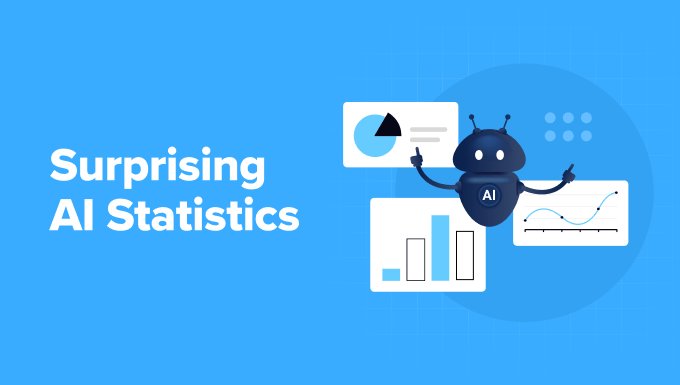
Top-Statistiken zur künstlichen Intelligenz, die Sie kennen müssen
Hier sind die wichtigsten KI-Statistiken, die wir in diesem Artikel behandeln werden. Sie können die Schnelllinks unten verwenden, um zu Ihrem bevorzugten Thema zu springen:
- AI Market Size: Stats About Its Explosive Growth
- AI in the Real World: Usage Statistics
- AI in Business: Use Cases and Statistics
- AI in Marketing: Key Statistics That Prove Its Success
- AI in Web Development: How Web Pros Use AI
- Impact of AI: Expectations and Concerns
KI-Marktgröße: Statistiken über sein explosives Wachstum
Zuerst werden wir uns das beeindruckende Wachstum des globalen Marktes für künstliche Intelligenz ansehen. Diese Statistiken zeigen Ihnen, wie groß er heute ist.
1. Der globale KI-Markt könnte bis Ende 2025 bis zu 757 Milliarden US-Dollar erreichen.
Schätzungen variieren, aber einige Marktforschungsberichte prognostizieren, dass der globale KI-Markt bis Ende 2025 bis zu 757 Milliarden US-Dollar erreichen könnte. Dies umfasst Software, Dienstleistungen, Infrastruktur und Hardware in vielen Branchen.
Ein Bericht legt sogar nahe, dass der Markt bis 2033 4,8 Billionen US-Dollar erreichen könnte.
Um das in Perspektive zu setzen, selbst bei 244 Milliarden US-Dollar sind das mehr als 660 Millionen US-Dollar, die jeden Tag für KI ausgegeben werden.
Was bedeutet das für Sie? Für Kleinunternehmer bedeutet dies ein wachsendes Ökosystem von KI-Tools, die Ihre Aufgaben automatisieren, die Produktivität verbessern und Ihnen helfen können, sich von der Konkurrenz abzuheben.
Profi-Tipp: Benötigen Sie Empfehlungen für KI-Plugins? Sehen Sie sich unsere Liste der besten WordPress-Plugins mit künstlicher Intelligenz an.
2. KI-Investitionen könnten bis zu 4 % des US-BIP beitragen.
Bei einem US-BIP von rund 25 Billionen US-Dollar wären das etwa 1 Billion US-Dollar pro Jahr!
Für Kleinunternehmer und Website-Besitzer signalisiert dies eine massive Welle von Wachstum, Innovation und Wettbewerb. Die Nutzung von KI-Tools jetzt könnte Ihnen helfen, der sich entwickelnden digitalen Wirtschaft einen Schritt voraus zu sein.
3. Die Veröffentlichung von ChatGPT hat die Finanzierung von KI-Startups erheblich angekurbelt
Seit ChatGPT ein Begriff wurde, ist das Investoreninteresse an KI in die Höhe geschossen. Allein im Jahr 2024 sammelten KI-Startups über 110 Milliarden US-Dollar – ein Anstieg von 62 % im Vergleich zum Vorjahr.
OpenAI, das Unternehmen hinter ChatGPT, sicherte sich im Jahr 2024 eine neue Finanzierung in Höhe von 6,6 Milliarden US-Dollar. Am 31. März 2025 schlossen sie dann eine weitere Finanzierungsrunde über 40 Milliarden US-Dollar mit einer Bewertung nach der Finanzierung von 300 Milliarden US-Dollar ab, angeführt von SoftBank mit Beteiligung von Microsoft und anderen.
Für Unternehmer und Entwickler bedeutet diese Welle von Finanzmitteln schnellere Innovationen, bessere Werkzeuge und mehr Möglichkeiten, intelligentere Websites und Dienste zu entwickeln, die von KI angetrieben werden.
4. Der globale KI-Gesundheitsmarkt wächst mit einer Rate von 37 %.
Das Gesundheitswesen ist führend bei der Einführung von KI. Und nein, es geht nicht nur um Roboterärzte.
Denken Sie intelligenter Terminplanung für Termine und Operationen sowie automatisierte administrative Aufgaben, die medizinischem Fachpersonal mehr Zeit für die Patientenversorgung verschaffen.
Dies sind nur einige Beispiele dafür, wie KI das Gesundheitswesen für alle zugänglicher und effizienter macht.
5. China, Indien und die Vereinigten Arabischen Emirate führen die KI-Adoption an.
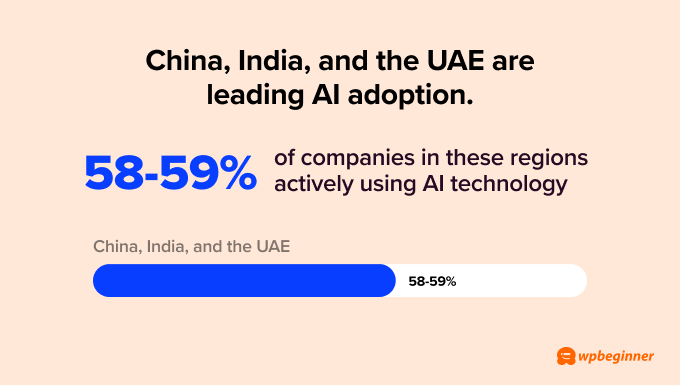
Laut IBMs Forschung stehen China, Indien und die Vereinigten Arabischen Emirate an der Spitze, wobei satte 58-59 % der Unternehmen in diesen Regionen aktiv KI-Technologie einsetzen.
Dies steht in starkem Kontrast zu Ländern wie Australien (29 %) und Frankreich (26 %), wo die KI-Adoptionsrate deutlich niedriger ist.
Weitere Statistiken zur Marktgröße von KI
- Die globalen KI-Investitionen werden bis Ende 2025 voraussichtlich 200 Milliarden US-Dollar erreichen.
- Der Markt für KI-gestützte Hardware und Dienstleistungen wird bis Ende 2025 voraussichtlich 90 Milliarden US-Dollar erreichen.
- Generative KI wird voraussichtlich in den nächsten zehn Jahren mit einer jährlichen Wachstumsrate von bis zu 42 % (CAGR – Compound Annual Growth Rate) wachsen, so verschiedene Marktprognosen. Dies beinhaltet das Wachstum von Tools wie KI-Schreibern, Bildgeneratoren und Code-Assistenten.
- Forbes erhielt in diesem Jahr 1.900 Einreichungen für seine jährliche AI 50-Liste, was doppelt so viele sind wie im letzten Jahr und den Aufschwung bei KI-Startups zeigt.
- Die 5 größten KI-Unternehmen sind Tech-Giganten wie Microsoft, Google (Alphabet), NVIDIA, Meta und Tesla.
KI in der realen Welt: Nutzungsstatistiken
Wir haben das beeindruckende Wachstum des KI-Marktes untersucht, aber wie wirkt sich das in der realen Welt aus?
Tauchen wir ein in einige KI-Nutzungsstatistiken, um die Auswirkungen von KI zu sehen.
6. 52% der Nutzer berichten, dass sie generative KI jetzt mehr nutzen als zu Beginn.
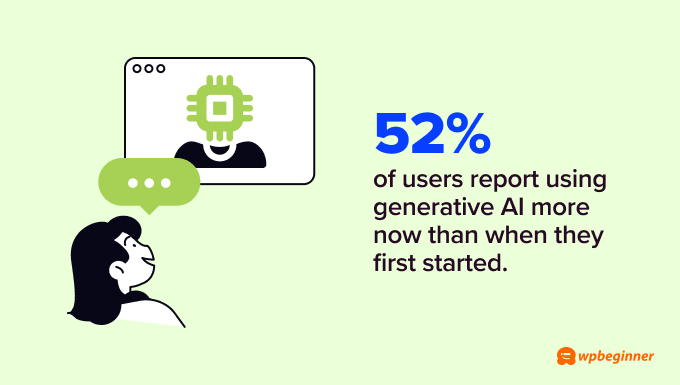
Diese Daten stammen aus einer Salesforce-Studie mit 8.000 Befragten in den USA, Großbritannien, Australien und Indien. Sie repräsentieren nicht die gesamte Bevölkerung, zeigen aber, wie verbreitet der Einsatz von KI geworden ist.
Wenn Sie ein Softwareunternehmen betreiben, sollten Sie die Integration von generativen KI-Funktionen in Ihr Angebot in Erwägung ziehen. Dies kann Ihr Produkt benutzerfreundlicher und für Kunden attraktiver machen.
Zum Beispiel hat SeedProd, ein beliebter WordPress-Seitenersteller, einen KI-Assistenten, der Benutzern hilft, ansprechende Texte zu erstellen und Bilder zu generieren.
Es ermöglicht Ihnen sogar, eine ganze WordPress-Website mit KI zu erstellen.
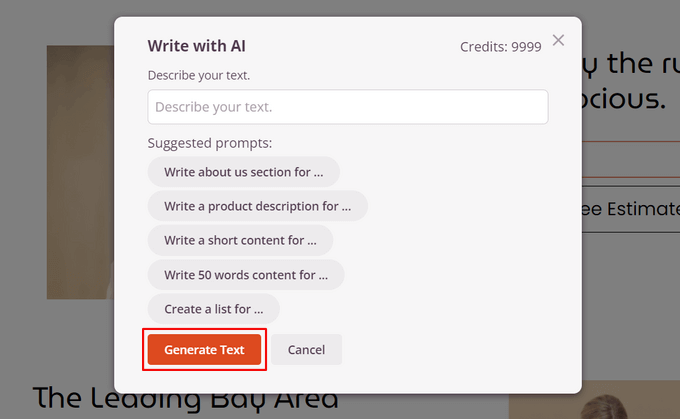
7. KI-Chatbots und KI-Schreiber sind die beliebtesten Arten von KI-Tools.
Das ist nicht überraschend, wenn man den Hype um KI-Anwendungen wie ChatGPT von OpenAI bedenkt. Allerdings sind einige Nutzer keine Fans der Nutzungsobergrenze und der langsamen Leistung, wenn viele Leute das Tool gleichzeitig nutzen.
Wenn Sie diese Probleme haben, können Sie sich unsere Liste der besten ChatGPT-Alternativen für Blogger und Vermarkter ansehen.
Zu den weiteren bemerkenswerten Akteuren in diesem Bereich gehören Gemini (früher Bard) und Writesonic. Sie eignen sich ebenso gut für die Erstellung von Inhalten für soziale Medien oder WordPress-Blogbeiträge.
Nicht weit hinter der Textgenerierung liegen Bildgeneratoren wie Midjourney sowie Video-, Musik- und Stimmengeneratoren.
62 % der erwachsenen Amerikaner nutzen Sprachassistenten.
Dazu gehören Tools wie Amazons Alexa und Apples Siri.
Der Grund für diese Beliebtheit? Bequemlichkeit.
86 % der Besitzer von Smart Speakern stimmen zu, dass ihre Geräte das Leben einfacher machen, indem sie ihnen ermöglichen, Aufgaben nur mit ihrer Stimme zu erledigen.
Aber diese Werkzeuge gehen darüber hinaus. Für Menschen mit Hörbehinderungen können Sprachassistenten ein leistungsstarkes Werkzeug für die Barrierefreiheit sein.
Wenn Sie Ihre Website für Nutzer mit Hörbehinderungen optimieren möchten, können Sie eine Sprachsuchfunktion hinzufügen. Weitere Informationen finden Sie in unserem Leitfaden zur Sprachsuche in WordPress.
Weitere Statistiken zur KI-Adaption in der realen Welt
- 65 % der Nutzer von KI-Content-Generierungs-Apps sind Gen Z oder Millennials.
- 72 % der Nutzer von generativen KI-Tools sind beschäftigt.
- Die Top 50 KI-Tools weltweit ziehen deutlich mehr Besuche an als bisher geschätzt. ChatGPT allein verzeichnete beispielsweise im März 2025 4,7 Milliarden monatliche Website-Besuche.
- Rund 80 % des Traffics zu den Top 50 KI-Tools stammt von Personen, die die Website-Adresse direkt eingeben.
- Der durchschnittliche Besuch eines KI-Tools dauert etwa 12,5 Minuten.
- Nur 11,4 % des Traffics zu den Top 50 KI-Tools stammt aus organischen Suchanfragen.
- Im Mai 2025 verzeichnete allein ChatGPT über 5,2 Milliarden Besuche in einem einzigen Monat und war damit die 5. meistbesuchte Website der Welt.
- Der Betrieb von KI-Modellen im großen Maßstab wie ChatGPT kann je nach Infrastruktur und Nutzungsgrad Hunderte von Tausenden von Dollar pro Tag kosten.
- KI-gestützte Empfehlungen für Facebook-Posts haben zu einer Steigerung der gesamten Verweildauer auf dem sozialen Netzwerk um 7 % geführt.
KI im Geschäft: Anwendungsfälle und Statistiken
Nachdem wir uns einige Statistiken zur künstlichen Intelligenz und ihrem Wachstum angesehen haben, wollen wir nun einige wichtige Erkenntnisse darüber gewinnen, wie Unternehmen diese Technologie einsetzen.
9. 78 % der Unternehmen setzen KI mittlerweile in mindestens einer Funktion ein.
Laut dem McKinsey-Bericht „State of AI 2024“ haben 78 % der Organisationen KI in mindestens eine Geschäftsfunktion integriert – ein Anstieg von 72 % im Vorjahr.
Die häufigsten Anwendungsfälle finden sich in den Bereichen Marketing, Vertrieb, Produktentwicklung und Kundenservice – alles Bereiche, die sich direkt auf den Umsatz auswirken.
Die Quintessenz? KI-Adoption ist nicht nur ein Technologietrend. Es ist ein Wettbewerbsumschwung. Und wenn Sie ein Unternehmen führen, ist jetzt die Zeit, aufzuholen, nicht zurückzufallen.
10. Chatbots können Unternehmen Milliarden an Kosten und Zeit sparen.
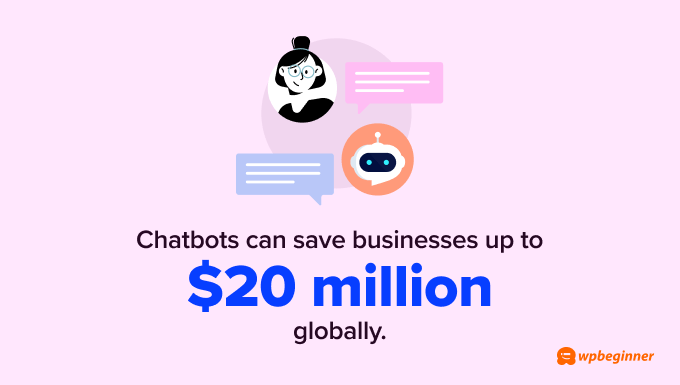
Kundensupport ist einer der teuersten und zeitaufwändigsten Bereiche eines Unternehmens. Deshalb nutzen immer mehr Unternehmen KI-gestützte Chatbots, um gängige Supportaufgaben zu erledigen und die Gemeinkosten zu senken.
Laut Juniper Research könnten Unternehmen bis zu 11 Milliarden US-Dollar und 2,5 Milliarden Stunden einsparen, indem sie Chatbots zur Automatisierung von Kundenservice-Interaktionen einsetzen.
Möchten Sie es selbst ausprobieren? Sehen Sie sich unser Tutorial zur Einbindung eines Chatbots in Ihre WordPress-Website an.
11. Im Durchschnitt berichten 42 % der Unternehmen von Kostensenkungen von bis zu 20 % durch KI.
Das ist eine erhebliche Einsparung, aber die Vorteile hören hier nicht auf. 52 % der Unternehmen, die KI einsetzen, verzeichnen auch einen Umsatzanstieg von bis zu 10 %.
Fertigung, Servicebetriebe sowie Marketing und Vertrieb profitieren am meisten. Angesichts solch vielversprechender Ergebnisse ist es keine Überraschung, dass die KI-Investitionen voraussichtlich steigen werden.
12. 40 % der Unternehmen, die KI einsetzen, erwarten, über 20 % ihrer Belegschaft umzuschulen.
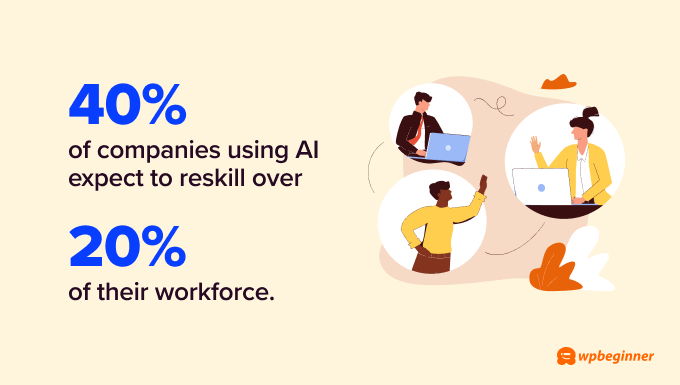
Es gab viel Angst vor der Vorstellung, dass KI durch Automatisierung zu Arbeitsplatzverlusten führen könnte. Unternehmen geben ihren aktuellen Mitarbeitern jedoch eher KI-Schulungen, um sie auf den neuesten Stand zu bringen.
Wenn Sie freiberuflich tätig sind, ist es eine gute Idee, die neuesten KI-Fähigkeiten zu erlernen. Machen Sie sich mit den neuen Technologien und KI-Systemen vertraut, die Menschen in Ihrem Bereich normalerweise verwenden, damit Sie für Arbeitgeber attraktiver erscheinen.
Mehr KI in Unternehmensstatistiken
- Kleine Unternehmen können potenziell bis zu 35.000 US-Dollar pro Jahr sparen, indem sie KI nutzen.
- Über 40 % der Kleinunternehmen haben KI genutzt, um Aufgaben zu automatisieren, wodurch sie und ihre Mitarbeiter mehr Zeit für wichtigere Aktivitäten aufwenden können.
- Laut einer Umfrage von Forbes Advisor sind die beliebtesten geschäftlichen Anwendungsfälle für KI Kundenservice (56%), Cybersicherheit (51%) und virtuelle Assistenten (47%).
- Geschäftsinhaber erwarten von KI-Tools wie ChatGPT, dass sie den Website-Traffic erhöhen (57 %), ihnen bei der Entscheidungsfindung helfen (48 %) und ihre Glaubwürdigkeit verbessern (47 %)).
- 82 % der Wirtschaftsführer halten die Verwendung von ChatGPT zum Entwerfen von Nachrichten an Kollegen für akzeptabel.
- 42% der Unternehmen halten die Schulung von Mitarbeitern in der Nutzung von KI für die größte Herausforderung bei der Einführung von KI.
Tipp 💡: Sie fragen sich, wie Sie KI effektiver für Ihr kleines Unternehmen einsetzen können? Lesen Sie unseren umfassenden Leitfaden für Kleinunternehmer zur KI mit Schritt-für-Schritt-Anleitungen ohne Fachjargon.
KI im Marketing: Wichtige Statistiken, die ihren Erfolg belegen
Ein Bereich, in dem KI erfolgreich war, ist das Marketing.
Werfen wir einen Blick auf einige beliebte Wege und Statistiken, wie Vermarkter KI einsetzen.
13. Im Durchschnitt kann KI Marketingfachleuten etwa 2,5 Stunden pro Tag sparen.
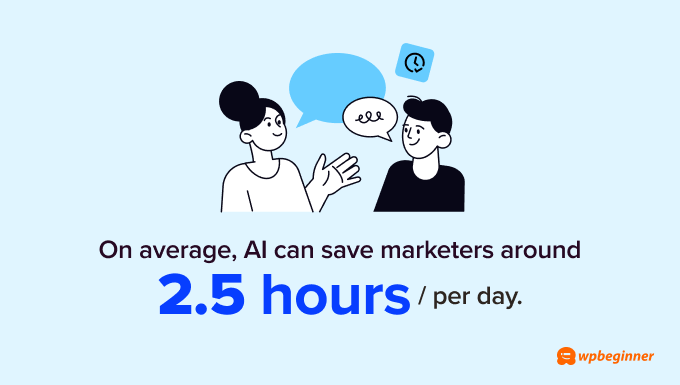
Laut HubSpot entspricht dies etwa 25-26 zusätzlichen Arbeitstagen pro Jahr. Dies gibt Marketern wertvolle Zeit frei, um sich auf strategischere Aspekte ihrer Arbeit zu konzentrieren, wie z. B. Planung, kreative Unternehmungen und Teammanagement.
Die gute Nachricht ist, dass Sie kein KI-Experte sein müssen, um loszulegen. Unser Leitfaden zur Nutzung von KI zur Steigerung Ihres Marketings ist ein großartiger Ausgangspunkt.
14. 53 % der Vermarkter nutzen KI zur Erstellung von Inhalten und zur Durchführung kleinerer Bearbeitungen vor der Veröffentlichung.
KI-gestützte Schreibassistenten werden so gut, dass viele Vermarkter nur noch geringfügige Änderungen vornehmen müssen, bevor sie veröffentlichen.
Aber hier ist die Sache: KI ist leistungsstark, aber sie ersetzt keine menschliche Expertise.
Während KI Inhalte schnell erstellen kann, ist es wichtig zu bedenken, dass sie nicht perfekt ist. KI-generierte Inhalte können manchmal ungenau sein oder versteckte Vorurteile in den Daten widerspiegeln, die sie verwendet. Deshalb verwenden Vermarkter gerne KI-Inhaltsdetektoren, um dabei zu helfen.
Stellen Sie es sich so vor. KI kann Ihnen helfen, einen Blogbeitrag über die besten Kaffeezubereitungsmethoden zu schreiben, aber sie kann nicht das Wissen und die Erfahrung eines Baristas ersetzen. Suchmaschinen legen Wert auf qualitativ hochwertige, informative Inhalte, und das erfordert oft eine menschliche Note.
Weitere Informationen finden Sie unter ob KI-generierter SEO-Content schlecht ist.
15. 25 % der Vermarkter nutzen KI zur Erstellung von Produktbeschreibungen.
Das Schreiben von Produktbeschreibungen mag einfach erscheinen, kann aber knifflig sein. Sie müssen die Funktionen hervorheben, die Kunden zum Kauf überzeugen, und es ist leicht, in der Routine stecken zu bleiben und immer wieder dieselben Formulierungen zu verwenden.
Hier kann KI ein hilfreicher Assistent sein. Sie kann keine perfekten Beschreibungen allein schreiben, aber sie kann ein großartiger Brainstorming-Partner sein. KI kann Ideen vorschlagen, um Ihnen den Einstieg zu erleichtern, und sogar überzeugende Formulierungen empfehlen, die bei Ihrer Zielgruppe Anklang finden.
Darüber hinaus können Sie KI nutzen, um aussagekräftige Überschriften für Ihre Produkt-Landingpages zu erstellen. Lesen Sie unseren Leitfaden zur Verwendung von KI zum Schreiben von Überschriften für Schritt-für-Schritt-Anleitungen.
16. Ein Bekleidungsunternehmen steigerte die Konversionsrate um 50 % durch KI-gestützte Personalisierung.
Norrøna, eine skandinavische Bekleidungsmarke, nutzte KI, um eine umfassende, personalisierte Empfehlungsplattform zu erstellen, indem sie Kundendaten analysierte und maschinelles Lernen einsetzte.
Die Ergebnisse waren beeindruckend: eine Steigerung der Klickrate um 187 % und eine Steigerung der Konversionsrate um 50 %, zusätzlich zu erheblichen Zeitersparnissen bei manuellen Aufgaben.
Personalisierung muss nicht kompliziert sein. Das Geheimnis liegt darin, Ihre Kunden zu verstehen. Indem Sie Kundenreisen auf Ihrer E-Commerce-Website verfolgen, können Sie wertvolle Einblicke in deren Surfverhalten und Vorlieben gewinnen.
Sobald Sie die Bedürfnisse Ihrer Kunden verstehen, können Sie ihnen über Upsells und Order Bumps ergänzende Produkte oder Kollektionen vorschlagen.
Wenn beispielsweise jemand in Ihrem Online-Shop nach einer Skijacke sucht, ist die Empfehlung passender Skihosen eine natürliche Cross-Selling-Möglichkeit.
17. 44 % der Vermarkter glauben, dass die Nutzung von KI positive Auswirkungen auf SEO haben wird, während 5 % das Gegenteil denken.
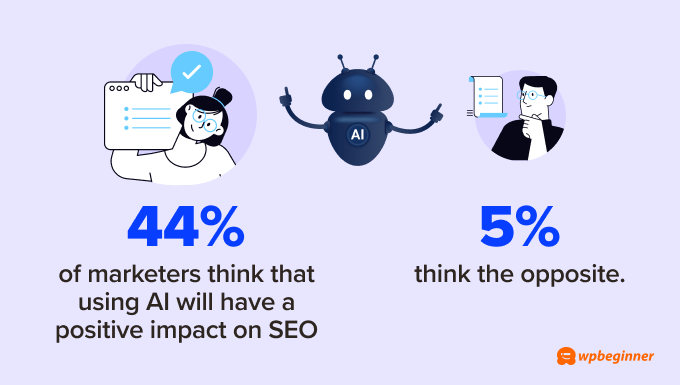
Auf der anderen Seite glaubt die Mehrheit (55%), dass KI ihre SEO-Strategie nicht wesentlich beeinflussen wird.
Letztendlich hängt es davon ab, wie Sie KI einsetzen, ob sie Ihren SEO-Bemühungen zugutekommt. KI kann beispielsweise Vorschläge zur Verbesserung Ihrer Inhalte machen oder sogar die Suchweise Ihrer Zielgruppe nachahmen, um Ihnen bei der gezielten Suche nach den richtigen Schlüsselwörtern zu helfen.
Es ist jedoch wichtig zu bedenken, dass sich KI noch in der Entwicklung befindet. Die Überprüfung von KI-generierten Informationen, insbesondere für Forschungszwecke, ist sehr wichtig.
Weitere Informationen finden Sie in unserem Leitfaden zur Verwendung von KI zur Steigerung Ihrer SEO.
Verwandter Beitrag: Leitfaden für Anfänger zur generativen Engine-Optimierung für WordPress.
18. Google AI Overviews erscheinen in 13–20 % der US-Suchergebnisse.
Jüngste Studien von Semrush und Dataos zeigen, dass Googles neue KI-Übersichten je nach Suchtyp in etwa 13–20 % der US-Suchergebnisse erscheinen.
Viele Website-Besitzer befürchten, dass ihre Websites Besucher verlieren könnten, wenn Benutzer die richtige Antwort bereits in den von Google generierten KI-Ergebnissen finden. Wir haben jedoch festgestellt, dass Ihre Website als vertrauenswürdig angesehen werden kann und Sie mehr Traffic erhalten können, wenn Ihre Inhalte in einer KI-Übersicht enthalten sind.
Weitere Informationen finden Sie in unserem ultimativen Leitfaden zum Thema Optimierung Ihrer Website für Googles KI-Übersichten.
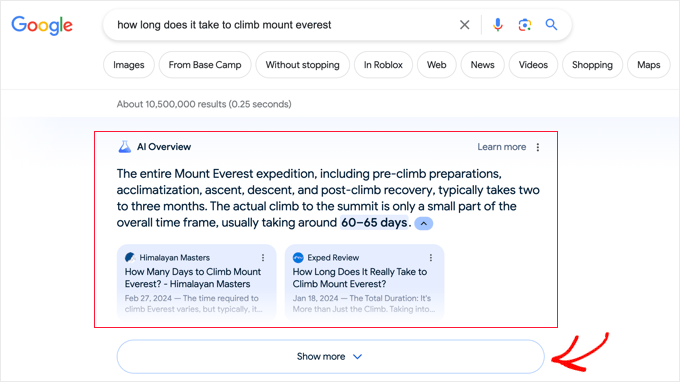
Mehr KI-Statistiken im Marketing
- 9 von 10 Unternehmen nutzen KI, um das Kundenerlebnis zu personalisieren.
- Über 60 % der Geschäftsleiter, die das Kundenerlebnis personalisieren, berichten von besseren Kundenbeziehungen und höherer Kundenbindung.
- 21 % der Vermarkter nutzen KI, um Texte in Kernpunkte für die Wiederverwendung von Inhalten zusammenzufassen.
- 45 % der Vermarkter nutzen KI, um ihre Kampagnen zu analysieren und diese Marketingdaten in leicht verständliche Berichte umzuwandeln.
- 37 % der Vermarkter nutzen KI zur Analyse ihrer Blogbeiträge, um zu verstehen, was funktioniert und was nicht.
- 28 % der Vermarkter nutzen KI, um E-Mail-Marketing-Texte zu generieren.
- 31 % der Vermarkter nutzen KI zur Erstellung von Social-Media-Posts.
- 74 % der Vermarkter glauben, dass KI ihren Inhalten hilft, in den Suchmaschinenergebnisseiten höher zu ranken.
- 84 % der Vermarkter sagen, dass KI ihnen hilft, Inhalte zu erstellen, die besser zu dem passen, wonach die Leute online suchen.
- Nur 4% der Vermarkter nutzen KI, um Inhalte zu generieren, ohne sie vor der Veröffentlichung selbst zu bearbeiten.
Experten-Tipp: Möchten Sie das Beste aus KI für Ihre Marketingstrategie herausholen? Schauen Sie sich unsere ultimative Liste von ChatGPT-Prompts für Blogger, Vermarkter und Social-Media-Profis an.
KI in der Webentwicklung: Wie Web-Profis KI einsetzen
KI sorgt in der Welt der Webentwicklung für Furore mit Tools, die Code verbessern, kreative Inhalte generieren und sogar datengesteuerte Vorschläge zur Gestaltung Ihrer WordPress-Website bieten können.
Tauchen wir in die Statistiken ein, um zu sehen, wie KI die Webentwicklung beeinflusst.
19. 93 % der Webdesigner nutzen KI zur Gestaltung einer Website.
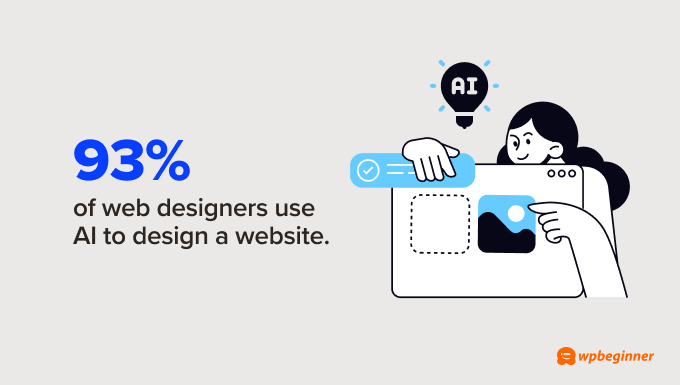
Wie nutzen Designer dieses leistungsstarke Werkzeug? Die HubSpot-Umfrage zeigt einige interessante Trends.
Über die Hälfte (58 %) nutzen KI zur Generierung von Bildern und anderen visuellen Assets, was ihnen Zeit bei der Erstellung erster Konzepte spart. Überraschenderweise nutzen 50 % KI zur Erstellung ganzer Webseitendesigns, obwohl menschliche Expertise für den letzten Schliff immer noch entscheidend ist.
Sogar die Benutzererfahrung (UX) erhält einen KI-Schub, wobei 20 % der Designer KI zur Identifizierung potenzieller Usability-Probleme und 40 % zur Verfolgung des Benutzerengagements einsetzen.
20. 9 von 10 Digitalagenturen haben durch den Einsatz von KI bis zu 10.000 US-Dollar gespart.
Laut einer Umfrage von Duda, einem Website-Builder, wird KI hauptsächlich zum Aktualisieren bestehender Seiten (59 %), zur Inhaltserstellung (55 %), zur Generierung von Grafiken für Kundenwebsites (53 %), zur Suchmaschinenoptimierung von Websites (40 %) und sogar zum Erstellen ganzer Websites (25 %) verwendet.
Da die Technologie besser wird, ist damit zu rechnen, dass die Zahl der Agenturen, die Websites mit KI von Grund auf neu erstellen, noch weiter steigen wird.
Wenn Sie eine Digitalagentur betreiben, sollte KI bereits in Ihrem Werkzeugkasten vorhanden sein. KI ermöglicht es Ihnen, schneller zu arbeiten, Geld zu sparen und letztendlich bessere Ergebnisse für Ihre Kunden zu erzielen.
21. Der Markt für KI-Website-Builder wächst jährlich um 32,9 %.
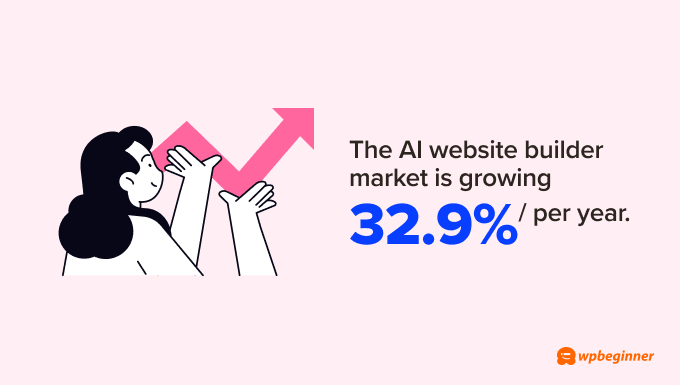
KI-Website-Builder sind Werkzeuge, mit denen Sie mit KI von Grund auf Websites erstellen können. Sie sind für Anfänger einfach zu bedienen und können Ihnen viel Zeit sparen.
Außerdem sind KI-Website-Builder oft eine erschwinglichere Option für kleine Unternehmen, insbesondere für diejenigen ohne technisches Team oder Budget für kundenspezifische Entwicklung.
SeedProd ist ein großartiges Beispiel für einen KI-gestützten Page Builder. Mit der Funktion des KI-Website-Builders können Sie in nur wenigen Sekunden eine komplette Landingpage oder eine Geschäftswebsite erstellen.

Außerdem hat Hostinger auch einen KI-gestützten Website-Builder, den Sie sich ansehen können.
Sie können unseren Leitfaden zur Erstellung einer WordPress-Website mit KI für Schritt-für-Schritt-Anleitungen einsehen.
22. Über 50 % der Nutzer können KI-gestaltete Websites nicht von menschlich erstellten unterscheiden.
In einer Sortlist-Studie mussten die Befragten erraten, welche Websites von KI und welche von Menschen erstellt wurden. Die Teilnehmer konnten oft keinen Unterschied zwischen KI-gestalteten und von Menschen erstellten Websites erkennen – etwa die Hälfte von ihnen hat falsch geraten.
Wenn Sie die Verwendung eines KI-Builders in Erwägung ziehen, müssen Sie sich keine Sorgen machen, dass Ihre Website unprofessionell aussieht. Plattformen wie SeedProd bieten eine große Auswahl an stilvollen, professionell aussehenden Vorlagen, die Ihnen helfen können, eine Website zu erstellen, die Ihr Zielpublikum beeindruckt.
Verwandt: Sehen Sie unsere ehrliche Meinung dazu, ob KI-Website-Builder den Hype wert sind.
Weitere Statistiken zur KI-Webentwicklung
- 49 % der Webdesigner nutzen KI, um neue Wege für die Gestaltung ihrer Websites auszuprobieren.
- 55% der Webdesigner sagen, dass sie von ihren Kunden oder Unternehmen ermutigt werden, KI zu nutzen, und sie haben KI-Richtlinien implementiert.
- Trotz der Beschleunigung ihrer Arbeit sind 38 % der Webdesigner leicht besorgt über die Auswirkungen von KI auf ihre Arbeitsplatzsicherheit.
- Die beliebtesten KI-Tools bei Agenturen sind ChatGPT (53 %) und Dall-E (47 %)
- Die meisten Agenturen messen den Erfolg von KI daran, wie viel Geld sie gespart hat (32 %) und wie effizient die Geschäftsabläufe gestaltet wurden (26 %)).
Auswirkungen von KI: Erwartungen und Bedenken
KI bietet spannende Möglichkeiten, wirft aber auch einige wichtige Überlegungen auf. Betrachten wir die Bedenken und Erwartungen rund um die Auswirkungen von KI.
23. Generative KI kann bis zu 4,4 Billionen US-Dollar zur Weltwirtschaft beitragen.
Um das ins rechte Licht zu rücken: Das entspricht dem Gesamtwert vieler großer Industrien weltweit.
Natürlich sehen wir die Vorteile bereits in Echtzeit, mit KI-gestützten Kundenservice-Tools und KI-Assistenten, die ganze Code-Schnipsel für Sie basierend auf Ihren Anweisungen generieren können. Erwarten Sie, dass die aktuelle Generation von KI-Tools noch intelligenter, schneller und hilfreicher wird.
24. Zwei Drittel der Arbeitsplätze könnten teilweise durch KI automatisiert werden.
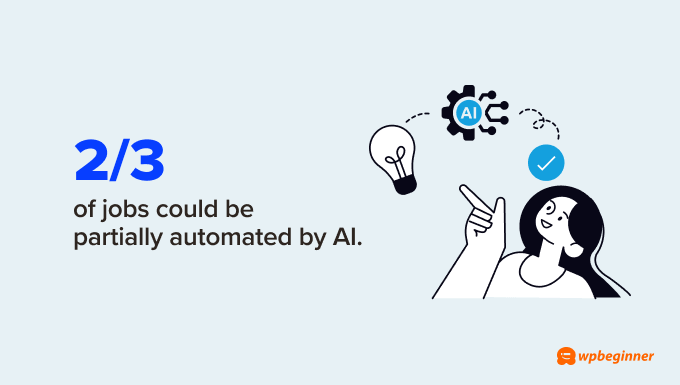
Mit anderen Worten, KI wird die Natur vieler Arbeitsplätze wahrscheinlich verändern, indem sie repetitive Aufgaben automatisiert und gleichzeitig neue Rollen schafft, die andere Fähigkeiten erfordern.
Darüber hinaus fand eine Studie des Ökonomen David Autor heraus, dass neue Technologien den Arbeitsmarkt ständig verändert haben. Offenbar existierten 60 % der heutigen Berufe im letzten Jahrhundert noch nicht einmal.
25. KI-Fortschritte werden in den kommenden Jahren 69 Millionen neue Arbeitsplätze schaffen.
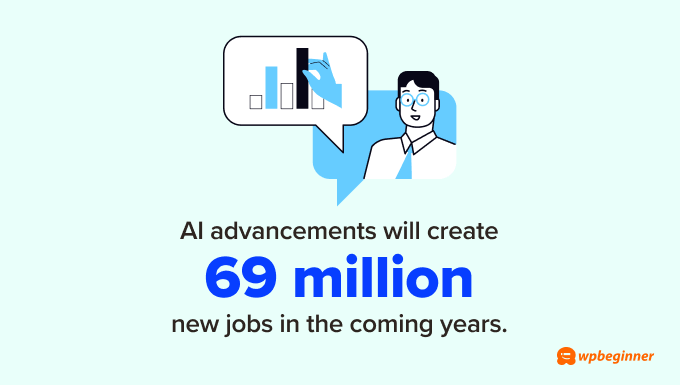
Ja, KI kann repetitive Aufgaben erledigen, aber sie ist nicht gut in Kreativität, Problemlösung oder emotionaler Intelligenz.
Nehmen wir zum Beispiel den Kundenservice. KI-Chatbots können einfache Fragen beantworten, aber wenn es um komplexe Probleme oder personalisierten Service geht, sind menschliche Kundendienstmitarbeiter immer noch unersetzlich.
Deshalb bleiben Geschäftstelefon-Supportdienste ein beliebter Supportkanal. Dies ermöglicht es Verbrauchern, direkte Hilfe bei komplexen Problemen zu erhalten, die Chatbots einfach nicht leisten können.
26. 80 % der Nutzer befürchten, dass KI für Cybersicherheitsangriffe eingesetzt wird.
Da KI eine relativ neue Technologie ist, sind die Menschen besorgt, dass sie für böswillige Zwecke wie Identitätsdiebstahl und Hacking missbraucht werden könnte.
Diese Sorge ist angesichts der Macht der KI berechtigt. Deshalb erwägen Regierungen, globale Vorschriften für die Entwicklung und Nutzung von KI zu schaffen.
27,22 % der Wirtschaftsführer sind besorgt über den Datenschutz bei der Verwendung von generativer KI.
Einer der größten Nachteile der Verwendung von generativer KI ist, dass die von Ihnen bereitgestellten Prompts und Daten zum Trainieren des KI-Modells selbst verwendet werden könnten.
Es besteht ein potenzielles Risiko, dass diese Daten durchsickern oder offengelegt werden, was für Unternehmen ein erhebliches Problem darstellen könnte, insbesondere für solche, die mit sensiblen Informationen umgehen.
Aus diesem Grund ist es wichtig, die Daten, die Sie mit generativen KI-Tools verwenden, sorgfältig zu prüfen. Bei hochsensiblen Informationen ist es am besten, bei bewährten Methoden zu bleiben. Generative KI kann jedoch ein wertvolles Werkzeug für Aufgaben sein, die öffentlich zugängliche Inhalte generieren.
Profi-Tipp: Möchten Sie Ihre WordPress-Website schützen? Lesen Sie unseren ultimativen Leitfaden zum Schutz von WordPress für fachkundige Anleitung.
Weitere Statistiken zu den Auswirkungen von KI
- Mehr als 40 % der Geschäftsinhaber machen sich Sorgen, zu sehr von KI-Technologien abhängig zu werden.
- Bis zu 29 % der Kundendienstjobs in den USA könnten durch Chatbots automatisiert werden.
- Nur 21 % der Unternehmen mildern die Risiken der Nutzung generativer KI.
- Ein Drittel der Unternehmen macht sich Sorgen, dass KI Fehlinformationen an ihre Mitarbeiter oder Kunden weitergibt.
- Bis Ende 2025 schätzen Branchenexperten, dass bis zu 10–20 % der Neufahrzeuge fortschrittliche KI-Funktionen wie Fahrerassistenzsysteme enthalten werden, jedoch keine vollständig autonom fahrende Technologie.
Quellen:
AiThority, Business Insider, Deloitte, Duda, Forbes, Global News Wire, Goldman Sachs, Hootsuite, HubSpot, IBM, McKinsey, Mitre, NPR, PWC, Precedence Research, Salesforce, Sortlist, Statista, Tech.co, Twilio Segment, Workable, und ZDNET.
Wir hoffen, dass diese ultimative Liste von KI-Statistiken Ihnen helfen kann, fundierte Entscheidungen über die Nutzung von KI für Ihr Unternehmen und Ihre Projekte zu treffen.
Suchen Sie nach interessanteren Statistiken? Sehen Sie sich unten weitere Forschungsartikel an:
Weitere Statistiken, Trends und Forschungsartikel
- Beeindruckende E-Commerce-Statistiken, die Sie nicht glauben werden
- Social-Media-Statistiken (ultimative Liste für Blogger)
- Influencer-Marketing-Statistiken, die Sie kennen sollten
- Statistiken zum Kaufabbruch im Warenkorb (Experten-Einblicke)
- Affiliate-Marketing-Statistiken, die Sie kennen müssen
- Creator Economy Statistiken, die Sie umhauen werden
- Internetnutzungsstatistiken und aktuelle Trends
- Ultimativer Bericht über Webhosting-Statistiken und Marktanteile
- Blogging-Statistiken, Trends & Daten – Ultimative Liste (AKTUALISIERT)
- Marketingstatistiken, Trends und Fakten (aktualisiert)
Wenn Ihnen dieser Artikel gefallen hat, abonnieren Sie bitte unseren YouTube-Kanal für WordPress-Video-Tutorials. Sie finden uns auch auf Twitter und Facebook.





Mrteesurez
Ich befürchte die Auswirkungen von Punkt Nr. 23: „Zwei Drittel der Arbeitsplätze könnten teilweise durch KI automatisiert werden“, da dies viele Menschen arbeitslos machen könnte. Beim Lesen von Punkt Nr. 24 bin ich jedoch froh, die Vorhersage zu sehen, dass KI-Fortschritte fast 69 Millionen Arbeitsplätze schaffen werden. KI ist in der Tat ein Segen für unsere Generation, wenn sie weise eingesetzt wird, und ich habe bemerkt, dass sich die Leute jetzt KI-Prompt-Ingenieure nennen.
Moinuddin Waheed
Künstliche Intelligenz hat jeden Sektor des menschlichen Lebens durchdrungen und die Art und Weise, wie wir Dinge früher wahrgenommen haben, enorm verändert.
Ich möchte mein Feld hervorheben, in dem ich es in der Webentwicklung eingesetzt habe.
Das Schreiben effizienter Codes und Codes für komplexe Algorithmen ist sehr einfach geworden.
Das Einzige, was man wissen muss, ist, die Aufgabe KI-Tools effizient zu erklären.
Das macht den gesamten Prozess der Webentwicklung einfach und schnell.
Ich nutze KI zur Inhaltserstellung.
Beim Erstellen und Generieren von Fotos und Bildern für das Web.
Es hat die menschlichen Anstrengungen in jedem Lebensbereich enorm reduziert und dehnt sich weiter aus.
Ich denke, es ist ratsam, KI so schnell wie möglich in unser tägliches Leben zu integrieren und sie effizient zu nutzen, um in jedem Arbeitsbereich positive Auswirkungen zu erzielen.
Jabed Hossain
Dieser Inhalt ist wirklich hilfreich für mich. Ich liebe dich, mein Schatz.
WPBeginner Support
Glad it was helpful
Admin
uzoma ichetaonye
Auf Nummer 14, die davon spricht: 53 % der Vermarkter nutzen KI, um Inhalte zu generieren und kleinere Bearbeitungen vor der Veröffentlichung vorzunehmen. Solche Bearbeitungen sollten nicht nur das Ändern einiger Wörter und Sätze umfassen, sondern auch das Hinzufügen relevanter Bilder, die den Text jedes Absatzes illustrieren, sowie das Erzählen persönlicher Geschichten und Erfahrungen.
Tatsächlich ist dieser Fall des Hinzufügens von Geschichten sehr wichtig, da er die Leser am meisten anzieht, die von Ihren Erfahrungen lernen möchten.
Schließlich habe ich beobachtet, dass die KI in bestimmten Bereichen des Internets, insbesondere im Bereich der Online-Aufgaben, wirklich die Oberhand gewinnt. Der einzige Unterschied hier ist der Genauigkeitsaspekt, der nur von Menschen geleistet werden kann.
Danke WPbeginners für diese fantastischen KI-Statistiken.
WPBeginner Support
Gern geschehen!
Admin
Jiří Vaněk
Ein interessanter Punkt ist die Kostenreduzierung um bis zu 20 % dank künstlicher Intelligenz. Das bedeutet, dass künstliche Intelligenz schrittweise Positionen ersetzen wird, die derzeit von Menschen besetzt sind, und es ist möglich, dass die enorme Entwicklung der künstlichen Intelligenz auch zu massiven Entlassungen von Positionen führen wird, die nicht mehr benötigt werden. Gleichzeitig wäre ich daran interessiert, in Zukunft Statistiken zu sehen, die zeigen, inwieweit KI Website-Besitzer beeinflussen wird, wenn sie Suchmaschinen nicht mehr so stark nutzen und sich stattdessen auf Chatbots verlassen. All dies wird wahrscheinlich die Zukunft enthüllen und so interessant sein wie diese Statistiken.